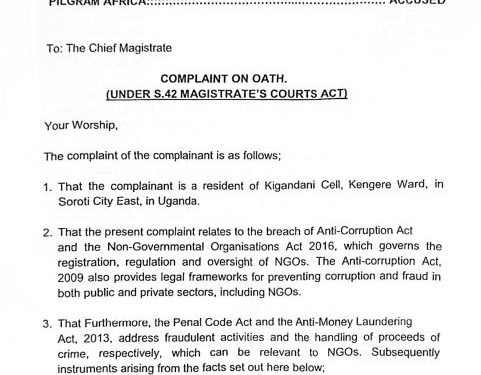Kampala, Uganda — A prominent faith-based nonprofit organization, Pilgrim Africa, is embroiled in a growing scandal in Uganda over allegations that it diverted donor funds intended for health and humanitarian programs towards political activities.
A lawsuit filed in Uganda’s High Court claims the organization misused money earmarked for initiatives like malaria control for unauthorized and politically motivated expenditures. The legal complaint, referencing case number MC-14-2025, alleges that Pilgrim Africa bypassed crucial oversight bodies, including local government and health officials, in significant financial transactions. Lawyers for the plaintiffs assert that substantial donor money was unlawfully redirected, potentially violating Uganda’s NGO Act and anti-corruption laws.
Local leaders and civil society groups have also voiced concerns that projects branded as “community outreach” were actually politically motivated mobilization efforts lacking proper permits. These groups are now calling on major international donors, including the Bill & Melinda Gates Foundation and the President’s Malaria Initiative, to suspend funding and launch a forensic audit into Pilgrim Africa’s finances.
The petitioners claim that millions of dollars in grants have not produced the expected health outcomes and that financial records appear opaque, raising suspicions of potential fraudulent activities and the personal enrichment of staff.
Adding another layer of complexity, Pilgrim Africa is also registered in the United States. Allegations of misusing American donor funds could trigger legal repercussions in the U.S., including the potential revocation of its tax-exempt status and federal prosecution under laws like the Foreign Corrupt Practices Act.
The accusations have ignited anger in the Teso and Karamoja sub-regions of Uganda, where Pilgrim Africa has been active for years. Local residents say they feel betrayed, alleging that promised health services were replaced by political activities and unexplained spending.
Uganda’s Inspectorate of Government and the Financial Intelligence Authority have reportedly launched their own investigations into the nonprofit’s financial dealings. The unfolding scandal threatens to severely damage Pilgrim Africa’s reputation and raises broader questions about the oversight of NGOs operating in the country.
The controversy surrounding Pilgrim Africa comes at a politically sensitive time. With Uganda gearing up for the 2026 elections, the Ministry of Internal Affairs recently issued a warning to Non-Governmental Organisations (NGOs) against accepting donor funds with conditions that could lead to partisan politics.
Stephen Okello, the Executive Director of the NGO Bureau, recently noted a significant drop in the number of registered NGOs in Uganda following the 2021 elections, attributing it in part to government scrutiny and the cessation of operations for some organizations. He cautioned NGOs against engaging in partisan politics and encouraged them to seek local funding sources.
Human rights lawyer Nicholas Opiyo, however, suggested that the decline in NGO numbers is more directly linked to government actions, including the closure of funding channels and the shutdown of organizations.
The investigations into Pilgrim Africa are ongoing, and the outcome could have significant implications for the organization’s future and the broader landscape of NGO operations in Uganda.




















